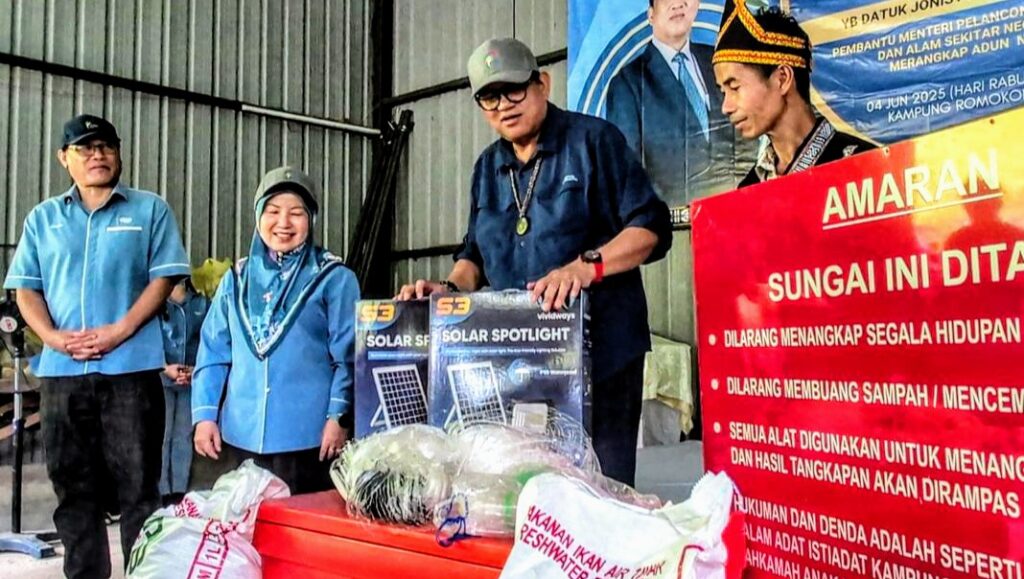Joniston (4th left) and Dr Shuhadah (3rd left) with Fisheries Department Officers and Kg Romokon community leaders releasing fish fries in the Sungai Taaran.

Joniston and Dr Shuhadah(2nd left) presenting fishing facilities and fish feeds provided by the Fisheries Department for the Kg Romokon Tagal System.
KIULU : – With its pristine rivers and thriving tagal system, Kiulu is charting a path towards sustainable fisheries tourism that prioritises environmental conservation while generating meaningful economic benefits for rural communities.
Assistant Tourism, Culture and Environment Minister Datuk Joniston Bangkuai, who is also the Kiulu assemblyman, believed this is the right time to strengthen sustainable fisheries tourism as part of a broader effort to promote low-impact, community-driven experiences in rural Sabah.
“We are not chasing after mass tourism. What we want are meaningful, small-scale experiences that connect people with nature and culture, while directly benefiting local communities,” he said.
He was speaking at the launching of the traditional tagal system at Sungai Taaran in far-flung Kampung Romokon here, an initiative driven by the community with the support of the State Fisheries Departmen, on Wednesday.
Present was Fisheries Department Deputy Director (Development) Datin Dr Shuhadah Mustapha.
The tagal system, a traditional community-enforced river conservation method, has long been practised in Kiulu.
In this system, villagers work together to protect river stretches by prohibiting fishing for a period of time to allow fish stocks to regenerate.
Joniston said the potential is already evident in Kiulu, where rivers and tributaries flow through villages that are actively preserving their ecosystems and these preserved sites have become quite an attraction over the years.
What is needed now, he said, is proper structure and support to transform existing efforts into sustainable tourism products.
“The communities in Kiulu have long played their part in protecting the rivers and offering basic tourism experiences such as fish feeding and guided walks.
“The next step is to enhance these efforts by introducing better storytelling, structured visitor packages, and community-led coordination to create a more impactful and sustainable tourism model that brings greater economic value to the villagers,” he said.
He noted that his Ministry, through the Sabah Tourism Board, is working closely with the Ministry of Rural Development and the Ministry of Agriculture, Fisheries and Food Industry (MAFFI) to align rural tourism with community development, basic infrastructural needs, and environmental goals.
“These three ministries complement each other. When we talk about fisheries tourism or agricultural tourism, agencies under MAFFI and rural development have an important role to play in terms of support, infrastructure, and technical expertise,” said Joniston, who chairs the Sabah Tourism Board.
Joniston suggested identifying selected tagal sites in Kiulu to be developed into eco-tourism pilot projects led by village cooperatives and youth groups.
The focus, he said, is on creating a tourism model that strengthens environmental education, promotes cultural appreciation, and delivers real benefits to the local communit
KIULU : – With its pristine rivers and thriving tagal system, Kiulu is charting a path towards sustainable fisheries tourism that prioritises environmental conservation while generating meaningful economic benefits for rural communities.
Assistant Tourism, Culture and Environment Minister Datuk Joniston Bangkuai, who is also the Kiulu assemblyman, believed this is the right time to strengthen sustainable fisheries tourism as part of a broader effort to promote low-impact, community-driven experiences in rural Sabah.
“We are not chasing after mass tourism. What we want are meaningful, small-scale experiences that connect people with nature and culture, while directly benefiting local communities,” he said.
He was speaking at the launching of the traditional tagal system at Sungai Taaran in far-flung Kampung Romokon here, an initiative driven by the community with the support of the State Fisheries Departmen, on Wednesday.
Present was Fisheries Department Deputy Director (Development) Datin Dr Shuhadah Mustapha.
The tagal system, a traditional community-enforced river conservation method, has long been practised in Kiulu.
In this system, villagers work together to protect river stretches by prohibiting fishing for a period of time to allow fish stocks to regenerate.
Joniston said the potential is already evident in Kiulu, where rivers and tributaries flow through villages that are actively preserving their ecosystems and these preserved sites have become quite an attraction over the years.
What is needed now, he said, is proper structure and support to transform existing efforts into sustainable tourism products.
“The communities in Kiulu have long played their part in protecting the rivers and offering basic tourism experiences such as fish feeding and guided walks.
“The next step is to enhance these efforts by introducing better storytelling, structured visitor packages, and community-led coordination to create a more impactful and sustainable tourism model that brings greater economic value to the villagers,” he said.
He noted that his Ministry, through the Sabah Tourism Board, is working closely with the Ministry of Rural Development and the Ministry of Agriculture, Fisheries and Food Industry (MAFFI) to align rural tourism with community development, basic infrastructural needs, and environmental goals.
“These three ministries complement each other. When we talk about fisheries tourism or agricultural tourism, agencies under MAFFI and rural development have an important role to play in terms of support, infrastructure, and technical expertise,” said Joniston, who chairs the Sabah Tourism Board.
Joniston suggested identifying selected tagal sites in Kiulu to be developed into eco-tourism pilot projects led by village cooperatives and youth groups.
The focus, he said, is on creating a tourism model that strengthens environmental education, promotes cultural appreciation, and delivers real benefits to the local community.



